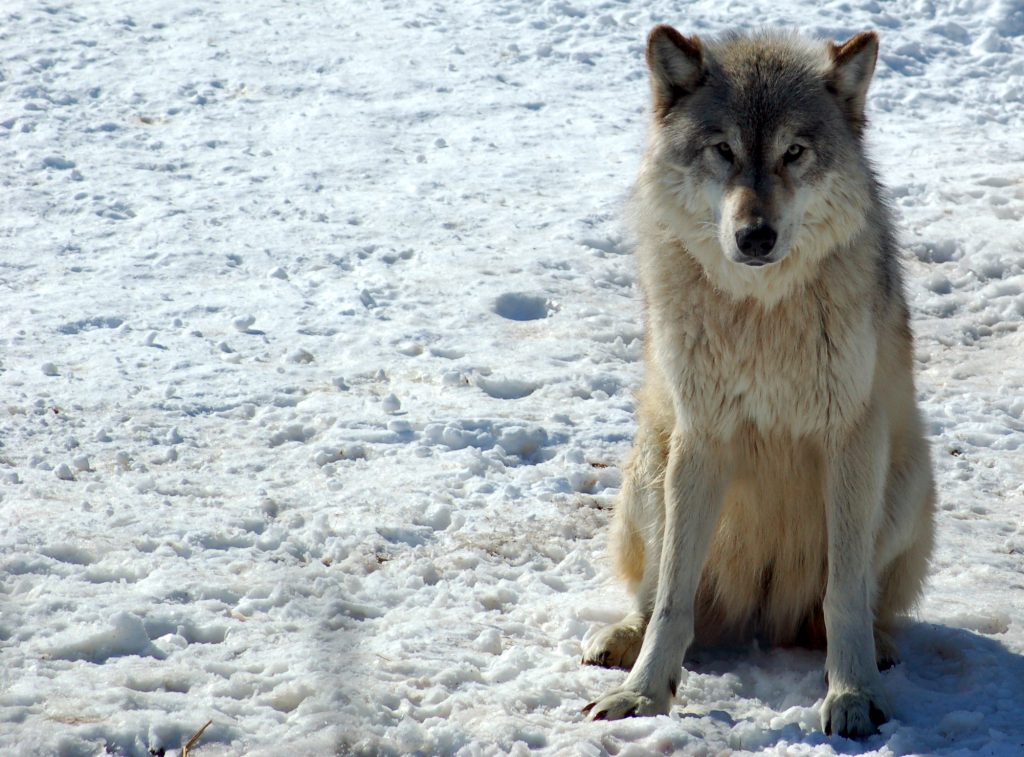6 Wisconsin Tribes Oppose Bill Scrapping Wolf Protections
Senators Tammy Baldwin and Ron Johnson sponsor bill to lift federal wolf protections.

Gray wolf. Photo by Derek Bakken / (CC BY 2.0)
Six Ojibwe tribes in Wisconsin are opposing legislation introduced by U.S. Sens. Ron Johnson and Tammy Baldwin to delist the gray wolf in the Western Great Lakes region and Wyoming.
The tribes sent a letter to Wisconsin’s U.S. Senate Delegation Wednesday, and it was signed by the Bad River, Lac Courte Oreilles, Lac du Flambeau, Red Cliff, Sokaogon Chippewa and St. Croix Chippewa tribes.
“Gray wolves deserve continued protection under the Endangered Species Act and a reprieve from the political infighting that continues to put them in jeopardy,” said Gussie Lord, an attorney for Earthjustice representing the tribes in a statement. “Wisconsin has already demonstrated its inability to properly manage the state’s wolf population, and this legislation would ensure another brutal hunt for this keystone species.”
In the letter, tribes pointed to the 2021 February wolf hunt where state-licensed hunters killed 218 wolves in less than three days. They highlighted the number of wolves harvested went beyond state-licensed hunters’ portion and the tribes’ portion of a 200-wolf quota.
“Wisconsin has shown a lack of understanding of, and often a complete disregard for, tribal wolf protection and management efforts,” the tribes wrote in the letter. “Over the past year, some Wisconsin leaders have explicitly tried to divest the Ojibwe tribes of their treaty rights by setting artificially high hunting quotas for the express purpose of nullifying the tribal treaty share.”
Wisconsin’s Natural Resources Board had approved a quota of 300 wolves for a wolf hunt that was planned to be held last fall, but the board’s current chair Greg Kazmierski had proposed a harvest as high as 500 wolves during discussion.
Baldwin and Johnson have said that the wolf population has recovered.
“Wisconsinites must have a say in the management of gray wolves,” said Johnson in a statement introducing the legislation. “In the western Great Lakes region, state wildlife agencies should manage the recovered population so the wolf’s ongoing role in the ecosystem does not come at the expense of farmers, loggers, sportsmen and people who simply live in these areas.”
Baldwin has said the bipartisan bill “is driven by science and is focused on delisting in the Great Lakes region, including Wisconsin.”
Not all scientists in Wisconsin agree that the wolf population has recovered, representing a divide over wolf conservation and management.
DNR data shows Wisconsin’s wolf population has more than quadrupled over the last two decades to roughly 1,100 wolves last year. The expansion of wolves has angered hunters and farmers who have pointed to increasing conflicts between wolves, pets and livestock, though the number of livestock killed by wolves makes up a fraction of the state’s 3.45 million cattle.
The Wisconsin Conservation Congress is a citizens group that advises the DNR and Natural Resources Board on policy regarding natural resource issues and surveys people’s opinions on items each spring.
Of Wisconsin residents who took part, the results show 12,978 people support a wolf population of 350 wolves while 6,410 said they oppose that number. There were 2,277 people who said they had no opinion on the matter.
The DNR is currently revising its wolf management plan, which was first written in 1999 and last updated in 2007. That plan includes a management goal of 350 wolves for the state. Hunters and farmers have supported the existing plan while wildlife advocacy groups, conservationists and tribes have argued it’s vastly outdated and not based on the best available science.
More than half of participants also opposed banning the use of dogs to hunt wolves with 9,573 state residents opposed and 9,137 residents in support of a ban. There were 2,526 residents who had no opinion. Wisconsin is the only state that allows using dogs to hunt wolves when the animal isn’t under federal protection.
6 Wisconsin tribes voice opposition to bill seeking to remove federal protections for wolves was originally published by Wisconsin Public Radio.





















Tammy Baldwin’s record on natural resources in Wisconsin is dismal. If she’s doing something with Ron Johnson you know it’s bad for the people of Wisconsin.
Getting sick and tired of Tammy Baldwin stabbing us in the back. She’s not trustworthy.
Shame on you, Baldwin.